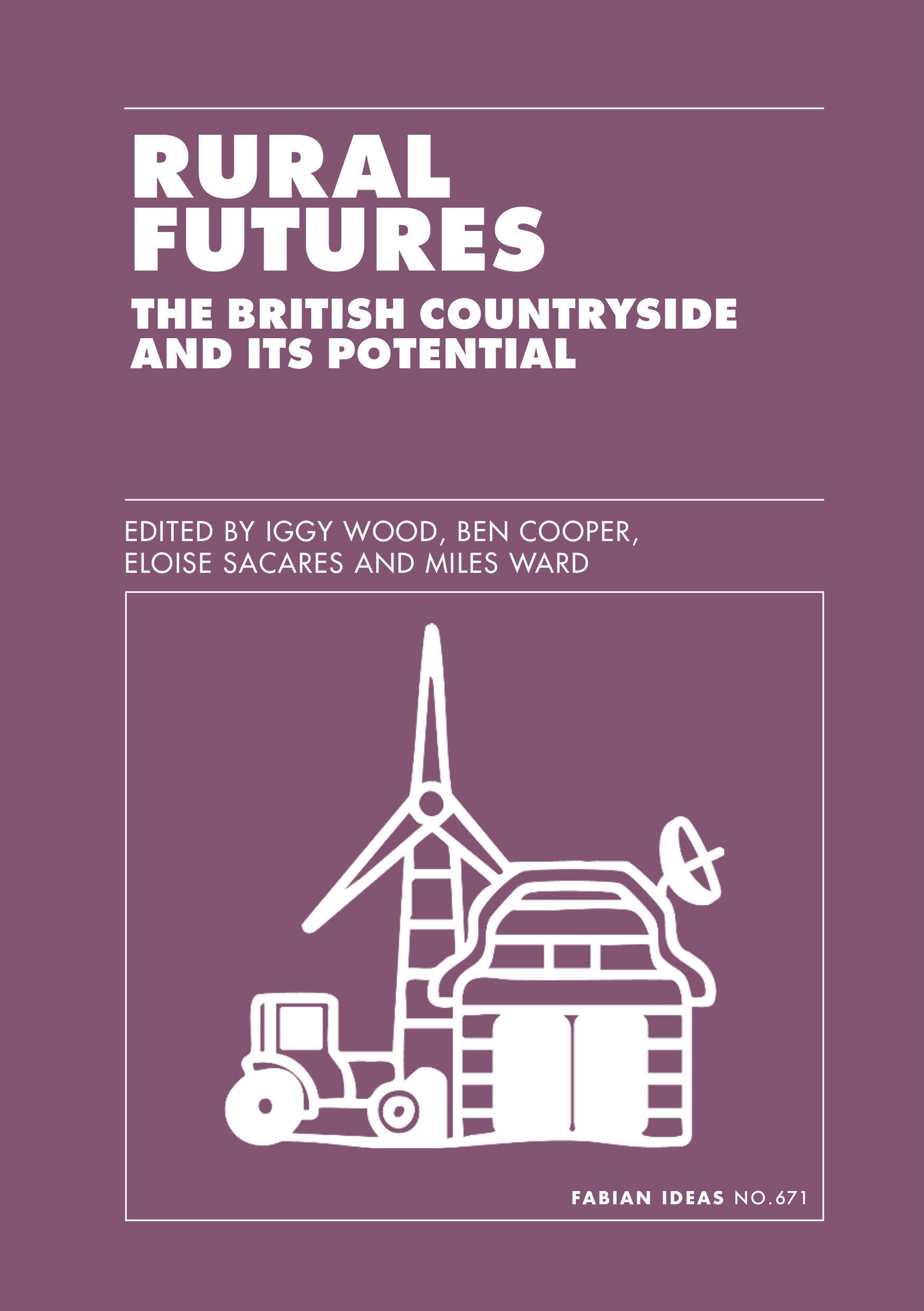T: 01822 851370 E: [email protected]
Visit RSN Survey about life in rural England to find out more.
October Edition of Casebook from the Rural Health and Care Alliance
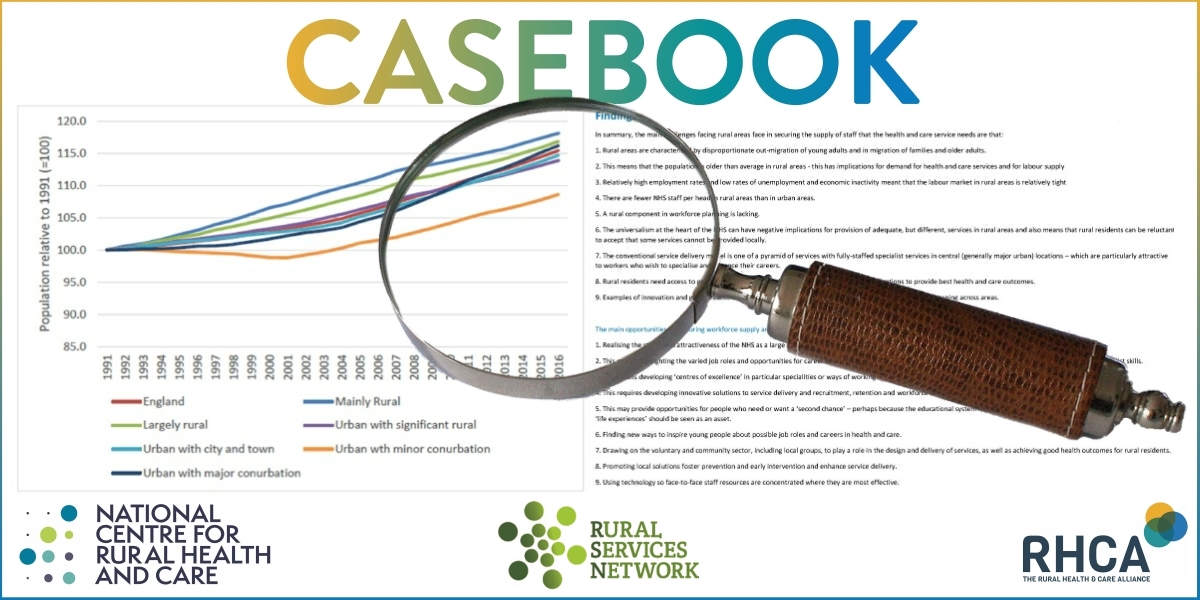 October 2025 Edition
October 2025 Edition
Welcome to this month’s edition of Casebook in which we kickstart by highlighting our Delivering for All survey by calling upon all those living in rural areas to have their say about services in their area including access to health and care. We also highlight a recent essay on rural health published by the Fabian Society, written by RSN CEO Kerry Booth. As well as focus on a healthy workplace initiative in Somerset; NHS rural recruitment challenges; fairer GP funding; children community health waiting lists; and an invite to our next Rural Health and Care Seminar this November, featuring another fantastic line-up. Read on!
Have Your Say: Delivering for All Survey
 The Rural Services Network’s Delivering for All survey is now live – and we want to hear from you.
The Rural Services Network’s Delivering for All survey is now live – and we want to hear from you.
If you live in a village, small town, hamlet or isolated rural area, please take just 8–10 minutes to share your experiences. The survey covers housing, healthcare, transport, digital connectivity, planning and net zero, all areas that affect everyday rural life.
Your anonymous responses will directly inform RSN’s work with Government, MPs and Select Committees. By adding your voice, you’ll help us build the evidence needed to secure fairer funding, better services, and stronger recognition of rural challenges and opportunities.
The more people who take part, the stronger the rural voice becomes. Please:
- Complete the survey: https://www.surveymonkey.com/r/deliveringforall
- Encourage others to join in – members and partners can use our ready-made copy to share on their own channels, this can be found here.
This is an important opportunity to ensure rural realities are placed at the heart of national decision-making. Have your say today.
TAKE THE SURVEY HERE
Rural Futures, Exploring the Potential of the Countryside
 A new pamphlet, Rural Futures: The British Countryside and its Potential, has been published by the Fabian Society and The Countryside Charity (CPRE). Launched during the recent Labour Party Conference, it brings together contributions from parliamentarians, policy specialists, and sector leaders.
A new pamphlet, Rural Futures: The British Countryside and its Potential, has been published by the Fabian Society and The Countryside Charity (CPRE). Launched during the recent Labour Party Conference, it brings together contributions from parliamentarians, policy specialists, and sector leaders.
The publication stresses that the countryside should be seen not only as a place of heritage and beauty but also as a driver of economic, social, and environmental renewal. Topics explored include housing, land use, transport, digital connectivity, and community health.
As part of the pamphlet, RSN’s Chief Executive, Kerry Booth, was invited to contribute Chapter 9: The NHS in the Country. Kerry’s essay sets out how health and care services can be delivered in ways that meet the distinct challenges faced by rural communities.
|
Healthy Workplaces Celebratory Event
 We’re excited to share details of this upcoming free event dedicated to recognising and inspiring employee health and wellbeing across workplaces based in North Somerset.
We’re excited to share details of this upcoming free event dedicated to recognising and inspiring employee health and wellbeing across workplaces based in North Somerset.
Date: Tuesday, 18 November 2025
Time: 10:00 AM – 3:30 PM
Location: The Royal Hotel, 1 South Parade, Weston-Super-Mare.
What’s happening:
Guest speakers delivering talks on key topics including:
- Neurodiversity and reasonable adjustments
- How are you? Out of 10?
- Eat Well, Work Well: Designing healthier food environments
- The Power of Movement: Funding change in North Somerset Workplaces
- Alcohol and the workplace; Opening the conversation
- How WorkWell West supports healthier workplaces
(Full programme on Eventbrite!)
Marketplace of stalls showcasing local resources and services available to support your workplace.
Networking opportunities with like-minded professionals who share your passion for healthier workplaces.
Awards presentation to recognise those workplaces making positive changes towards better workplace wellbeing.
Register now for your free ticket via Eventbrite (please advise any dietary requirements)
Whether you're an employer looking to enhance your wellbeing offer, or an employee keen to champion change, this event is a chance to connect, learn, and be inspired.
Learn more about the North Somerset Healthy Workplaces programme on the Better Health website.
Want to stay in the loop? Sign up for bi-monthly newsletter packed with practical tips, training opportunities, campaigns, and resources to support your team’s health and wellbeing.
Contact [email protected] for further information.
Communities Take The Lead In Tackling Rural NHS Recruitment
 A new study funded by the National Institute for Health and Care Research (NIHR) has explored how remote and rural communities are taking practical steps to attract and retain healthcare staff and their families.
A new study funded by the National Institute for Health and Care Research (NIHR) has explored how remote and rural communities are taking practical steps to attract and retain healthcare staff and their families.
The project, Come and Work Here!, examined five rural case studies – three in Scotland and two in England – documenting local, community-led initiatives designed to help address long-standing recruitment and retention challenges within the NHS.
Researchers found that communities are using a wide range of creative approaches to attract health professionals, including promotional videos, social media campaigns, help with accommodation, and informal support to help new arrivals settle into village life. Many of these initiatives drew on local assets and relied on volunteers with skills in communications, marketing or community engagement.
However, the study also highlights challenges, including the sustainability of volunteer-led efforts and wider barriers such as housing, access to schools, and employment opportunities for partners. Retention activity was often informal, relying on local networks rather than structured support, and the researchers call for stronger collaboration between communities, the NHS and government to develop sustainable, place-based workforce strategies.
“Successful recruitment and retention need to focus on the whole person and family, not just the job. There is an important role for communities to play – but they cannot be expected to solve all the challenges,” the authors conclude.
The team has also worked with the Scottish National Centre for Remote and Rural Health and Care to produce a freely available online ‘library of examples’, showcasing practical actions that communities have taken to support recruitment and retention.
Read the full NIHR report: Come and Work Here!
Explore the library of examples: Scottish National Centre for Remote and Rural Health and Care
Read the journal articles:
– Journal of Health Services Research & Policy
– Rural and Remote Health Journal
The Rural Perspective
The findings reinforce what both the State of Rural Services 2025 report and the Delivering for All roadmap have highlighted, that rural health and care systems face distinctive workforce and access challenges that require tailored policy responses.
According to State of Rural Services 2025 (Rural England CIC), many forms of primary and emergency healthcare are concentrated in urban and more accessible rural areas, and there has been a net decline in the number of GP surgeries in rural England. Although this reduction has been smaller than in urban areas, it has increased the distances that many rural residents must travel to access a GP. The report also finds that the number of hospitals in rural areas has declined by 35% over the past 15 years, with both travel and ambulance response times significantly longer than in urban areas. It notes that “many rural areas lack any healthcare-related infrastructure, be this a GP surgery, a dentist, a chemist or pharmacy, a care home or a defibrillator, let alone a hospital.”
In Delivering for All, the RSN calls for a rural workforce strategy to aid training and recruitment across all health and care services, including dentistry, and for fair funding that reflects the higher cost of delivering services in rural areas. The roadmap also emphasises the value of the third sector as an integral partner in delivering person-centred care and promoting wellbeing within rural communities
Government Review to Deliver Fairer GP Funding
 A six-month review of how GP funding is distributed across England has been launched to ensure that communities with the greatest health needs receive their fair share of NHS resources.
A six-month review of how GP funding is distributed across England has been launched to ensure that communities with the greatest health needs receive their fair share of NHS resources.
The Department of Health and Social Care and NHS England have announced plans to overhaul the Carr-Hill funding formula, which determines how resources are allocated to GP practices. The review, led by the National Institute for Health and Care Research (NIHR), will examine how factors such as deprivation, population growth and workload pressures can be better reflected in future allocations.
The current formula, which is around 25 years old, has been criticised for failing to keep pace with demographic and social change. The government says the reform will tackle health inequalities by ensuring that funding more accurately follows need, particularly in more deprived and coastal areas.
According to NHS data, GP practices in areas of higher deprivation are more likely to close, leaving residents with fewer doctors and longer waits. Evidence cited in the announcement shows that practices serving more deprived communities receive around 10% less funding per patient than those in more affluent locations, despite having higher demand and more complex cases.
The review will also consider lessons from areas such as Leicester, Leicestershire and Rutland Integrated Care Board, which identified major disparities in current funding distribution when compared to the actual needs of local populations.
Launching the review, Minister of State for Care Stephen Kinnock MP described the current system as “no longer fit for purpose,” saying that the new model will “end the postcode lottery of care” and ensure that investment in general practice reaches the communities most in need.
Dr Amanda Doyle, NHS England’s National Director for Primary Care, said the review would ensure practices serving the most deprived areas “receive a fair share of resources that reflects their need.”
The announcement forms part of the government’s wider 10-Year Health Plan, which places general practice at the heart of a shift from hospital-based to community care. It follows investment of £1.1 billion in general practice, recruitment of over 2,000 additional GPs, and the rollout of online appointment booking to help end the “8 a.m. scramble.”
The review will report its findings in six months and make recommendations on replacing the Carr-Hill formula.
Read the government announcement here
The Rural Reality
While the government announcement highlights deprived and coastal areas, it does not mention rural communities, which face many of the same structural barriers to primary care.
Evidence from Rural England CIC’s State of Rural Services 2025 report shows that people living in rural areas face significantly longer travel times to reach healthcare services. The report found that residents in villages, hamlets and isolated dwellings can face average minimum public-transport journey times of over 70 minutes to access their nearest GP surgery, compared with around 11 to 13 minutes for urban residents. It also noted that the number of hospitals located in rural areas has fallen by around 35% over the past 15 years, and that closures of GP surgeries have increased the distances many rural residents must travel to access care.
The Rural Services Network’s Delivering for All roadmap emphasises the need for public funding formulae that accurately reflect the higher costs of delivering services in rural areas and calls for better metrics to identify hidden deprivation that can be obscured by data designed for urban contexts. It also highlights the importance of ensuring that all national health and care strategies are Rural Proofed, so that residents in villages, market towns and remote communities receive equitable access to essential services.
Rural England also continues to face wider pressures across primary care, including workforce shortages and the closure of local services, underlining the importance of ensuring that this funding review takes rural health inequalities fully into account.
Everyone, no matter where they live, deserves fair and timely access to quality healthcare.
Children Facing Years-Long Waits for Community Health Care
 A new Nuffield Trust briefing highlights the worsening state of community health services in England, particularly for children and young people.
A new Nuffield Trust briefing highlights the worsening state of community health services in England, particularly for children and young people.
More than 1.1 million people are now waiting for NHS community care, and the steepest rise is among children. The report finds that almost one in four children have been waiting over a year, and one in 15 have been waiting more than two years for community health support.
The largest share of children’s waits (55%) are for community paediatric services, which include neurodevelopmental assessments such as autism and ADHD diagnoses, while a further 21% are waiting for speech and language therapy.
The analysis underlines the scale of pressure facing local NHS services that sit at the heart of the government’s planned ‘neighbourhood health’ model, which aims to move care closer to home. Yet community provision has long been under-resourced and under-measured, with no national waiting time targets and falling staff numbers.
The Nuffield Trust warns that without a dedicated strategy, “waits of over a year will remain commonplace”, undermining the shift from hospital to community care envisioned in the 10 Year Health Plan for England.
Read the full briefing here
Upcoming events
Book onto the upcoming Rural Health and Care Seminar by clicking below:
We’d love to hear from you - share what you’re proud of
If you have something, you would like us to feature in a future edition, please let us know by clicking here to send us an email.
Spread the word
If you know of other organisations that you think would benefit from joining the Rural Health & Care Alliance, please click here to email us and let us know.
RURAL SERVICES NETWORK
Up to date news on Health and Care
The Rural Services Network provides a useful source of themed news content and data. Check out the latest news on Rural Access to Health and Care Services and Vulnerability, where you’ll find articles on a diverse range of rural issues affecting rural communities.
Latest from RSN Member Insights
RSN Member Insights is the place to discover the statistics that define communities within our membership. It is regularly updated with new analyses, and these will be highlighted in the 'What's New' section of the RSN's Weekly Rural Bulletin. The Rural Bulletin also provides a selection of the most rurally topical news items, so do subscribe and encourage your colleagues to subscribe to what is an invaluable weekly periodical.
| The Rural Health & Care Alliance is a membership organisation administered by the Rural Services Network on behalf of the National Centre for Rural Health & Care. Explore the RHCA service below: |
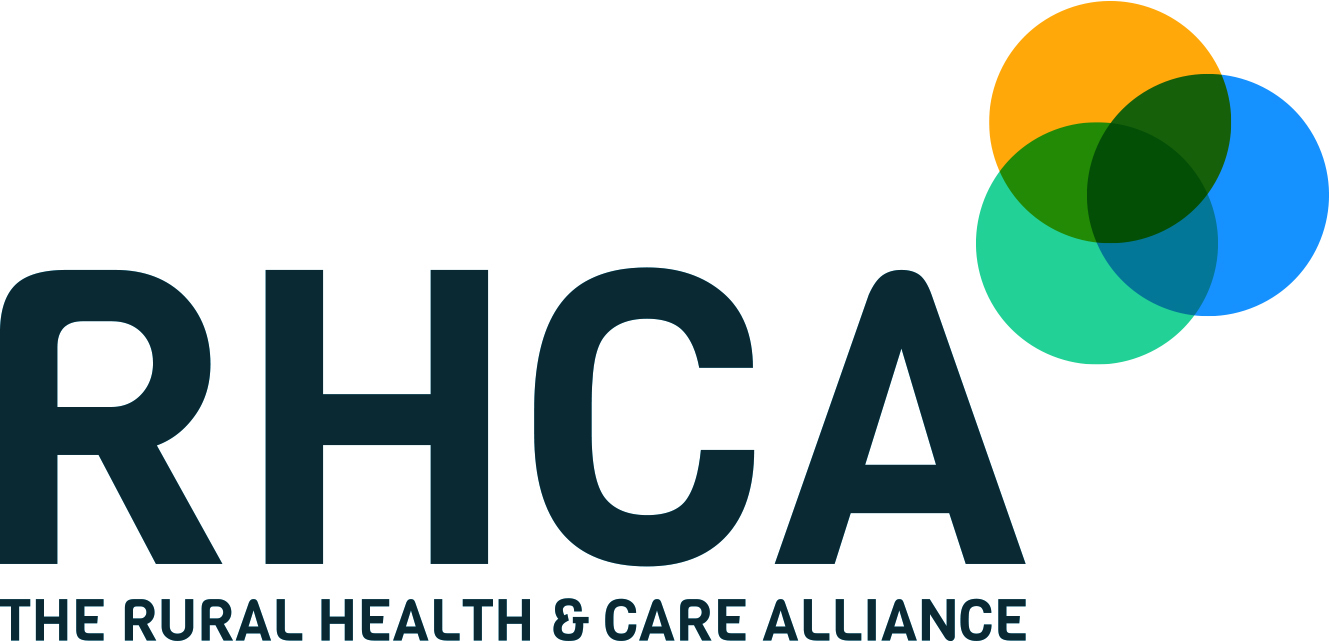 |
 |
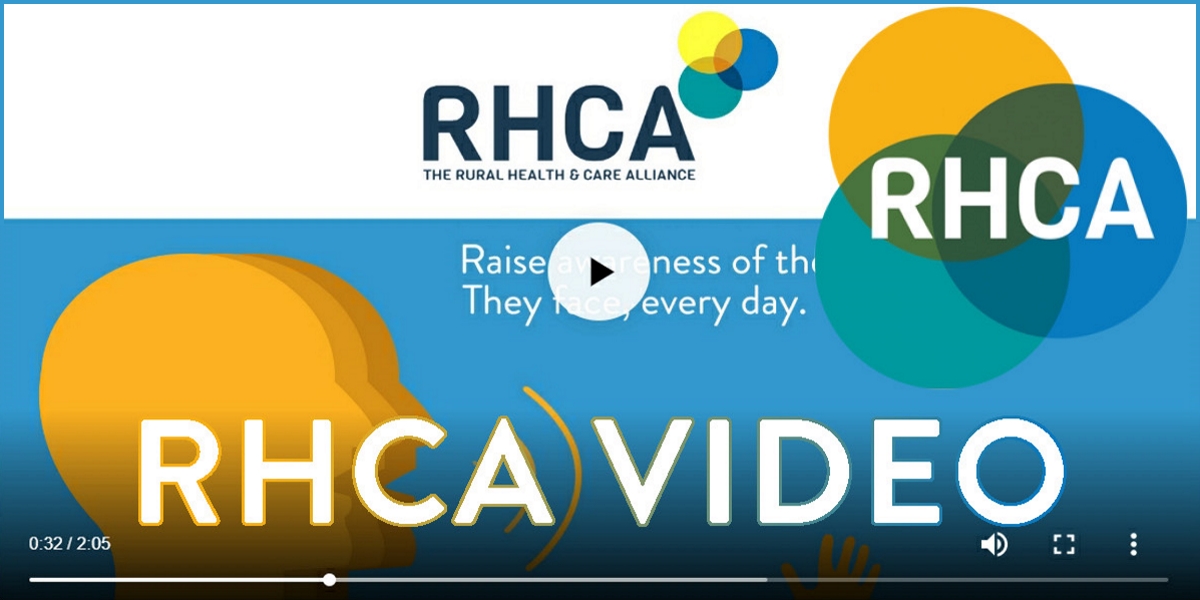 |
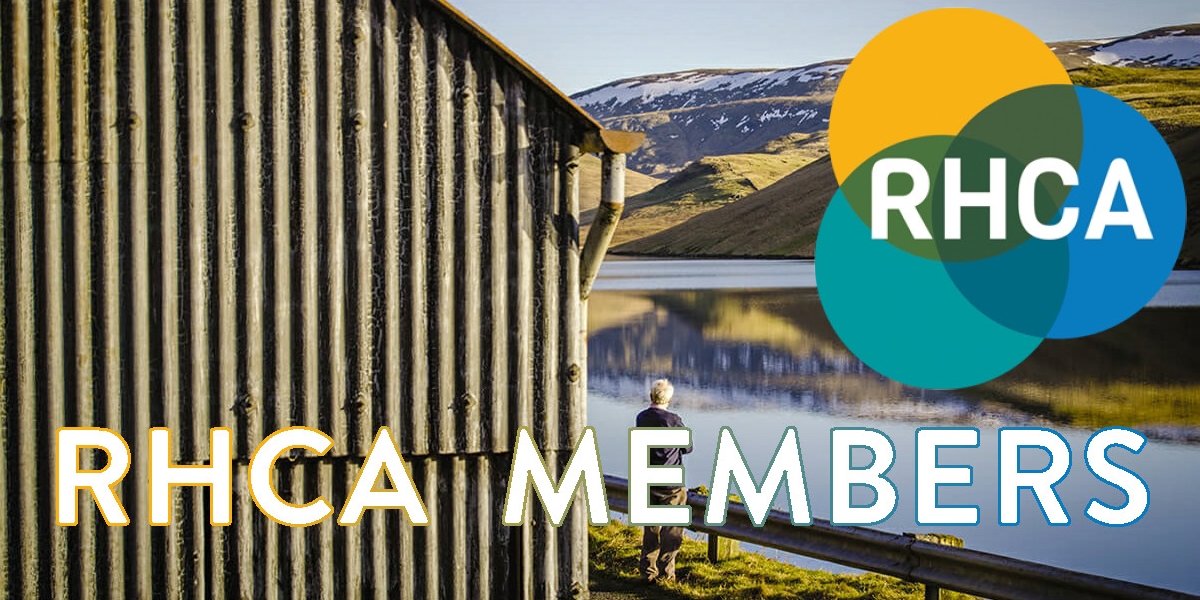 |
 |
 |
 |
 |
 |
 |

